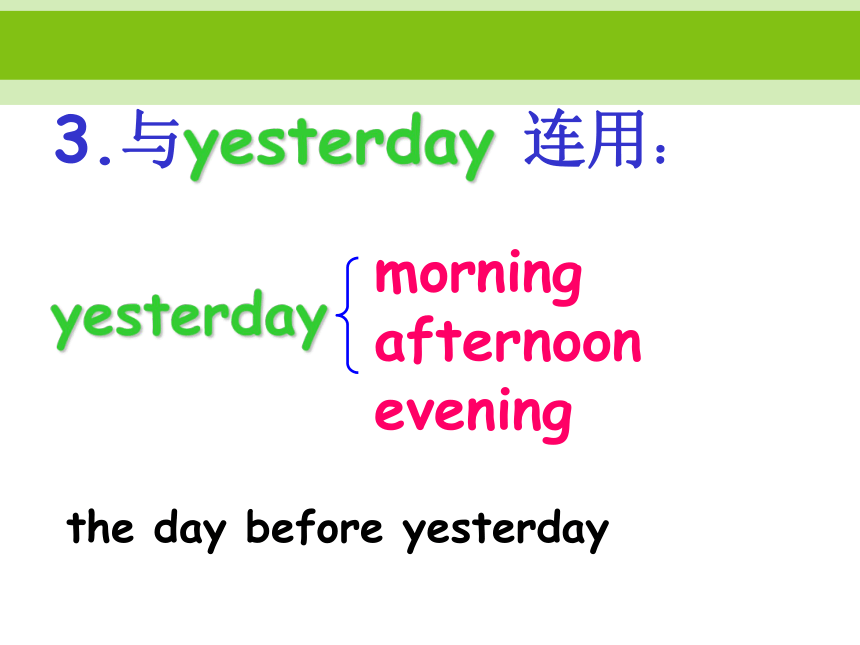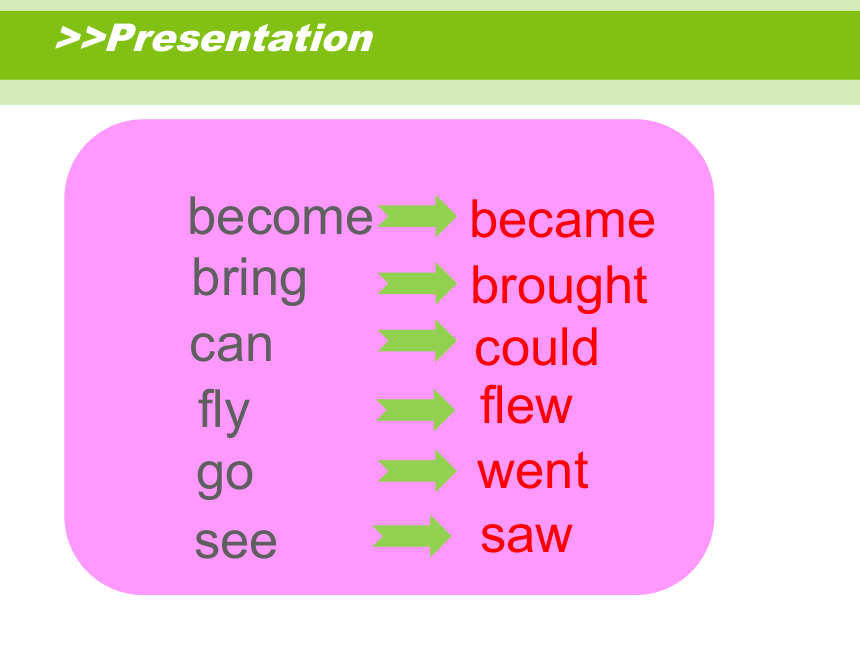Unit 3 Holiday fun(Grammar time-Fun time)课件(共41张PPT)
文档属性
| 名称 | Unit 3 Holiday fun(Grammar time-Fun time)课件(共41张PPT) |

|
|
| 格式 | ppt | ||
| 文件大小 | 2.1MB | ||
| 资源类型 | 教案 | ||
| 版本资源 | 牛津译林版 | ||
| 科目 | 英语 | ||
| 更新时间 | 2021-07-21 00:00:00 | ||
图片预览












文档简介
(共41张PPT)
Unit3
Holiday
fun
Grammar
time&
Checkout
time
Learn
the
Simple
Past
Tense.
2.
We
can
talk
about
something
that
happened
in
the
past.
Teaching
aims:
Please
reread
Grammar
Time
of
U1
and
U2
(复习第一、第二单元语法)
Self-learning
Part
一、时态介绍
定义:一般过去时态表示过去某个时间发生的动作或存在的状态。
常和表示过去的时间状语连用
时间状语:
yesterday
last
night
in
1990
two
days
ago
等
例如:
1.I
got
up
at
7:00
yesterday.
2.My
father
was
at
work
yesterday
afternoon.
1.与ago
连用:
a
moment
two
minutes
five
days
four
years
ago
用于一般过去时的时间状语
2.与last
连用
last
Time
Month
Year
night
yesterday
morning
afternoon
evening
the
day
before
yesterday
3.与yesterday
连用:
just
now
in
the
old
days
in
those
days
in
1980
the
other
day
at
that
time
once
upon
a
time
4.其他时间状语:
>>Presentation
……………..……….
Consolidation
laugh
laughed
point
pointed
like
showed
shouted
looked
lived
liked
walked
look
walk
show
shout
live
>>Presentation
……………..……….
Consolidation
am
was
is
was
were
are
>>Presentation
become
bring
can
fly
go
see
became
brought
could
flew
went
saw
Play
a
game
教师安排学生每组1人,以橡皮为投掷物,做游戏。第一位学生任意说出一个动
词,原形和过去式皆可,随后将手中的橡皮抛给小组内任意一名成员。接到橡皮的学生必须在三秒内说出相对应的形式,否则就淘汰出局。加分!
第一名
5分
第二名
3分
第一名
1分
Working
in
group
Part(互教)
Finish
P34
Checkout
time中的Write
and
say
>>Practice
Checkout
time
……………..……….
What
did
they
do
for
the
holiday?
Mike
and
Liu
Tao
went
to
the
Car
Museum.
They
____
many
cool
cars.
saw
>>Practice
Checkout
time
……………..……….
Yang
Ling
and
Helen
________________.
They
_______
a
new
film.
went
to
the
cinema
watched
>>Practice
Checkout
time
……………..……….
Yang
Ling
_________
Su
Hai
and
Su
Yang.
visited
>>Practice
Checkout
time
……………..……….
Miss
Li
________
a
birthday
party.
She
_______
many
friends.
had
saw
>>Practice
Checkout
time
……………..……….
Tim
visited
his
cousin
Jim.
They
__________________.
played
with
toy
cars
>>Practice
Checkout
time
……………..……….
Mr
Green
was
at
home.
He
_______________.
cleaned
his
cars
根据语境选择适当的疑问词(what,
where,
when,
how,
why)填空。如:
1)—___________
did
you
call
me?
—Because
I
wanted
to
give
you
a
fish.
2)—___________
did
they
go
this
summer
holiday?
—They
went
to
the
UK.
3)—___________
was
your
Children’s
Day?
—It
was
great
fun.
4)—___________
did
you
do
last
weekend?
—I
visited
my
grandparents.
5)—___________
did
he
go
to
Shanghai?
—He
went
to
Shanghai
last
week.
Self-learning
Part
Working
in
group
Part(互教)
一般过去式特殊疑问句的句型:
Show
time(展智)
规则动词词尾加
?
?
1.?
在清辅音后读作
[t]
。
如:
asked,?helped,?watched,?stopped?
?
2.?
在浊辅音、其他辅音和元音后读作
[d]
。如:
enjoyed,?studied,?moved,?called?
?
3.?
在
t?/?d
后读作
[id]
。
如:
wanted,?needed?
?
规则动词词尾加
?
?
1.?
在清辅音后读作
[t]
。
如:
asked,?helped,?watched,?stopped?
?
2.?
在浊辅音、其他辅音和元音后读作
[d]
。如:
enjoyed,?studied,?moved,?called?
?
3.?
在
t?/?d
后读作
[id]
。
如:
wanted,?needed?
?
特殊疑问词+一般过去时句子
(1)What
did
you/he
do
for
the
holiday?
(2)Where
did
you/
he
go
for
the
holiday?
(3)
How
was
your
holiday?
It
was
…
>>Presentation
………..…………....
Grammar
time
What
Where
did
you
do
he
go
for
the
holiday
?
>>Presentation
………...…………....
Grammar
time
I
He
visited
the
Shanghai
Museum
to
a
farm
.
went
>>Presentation
………...…………....
Grammar
time
How
was
your
holiday
?
It
was
great
fun
.
Why
did
you
call
me
?
Because
I
wanted
to
give
you
the
fish
.
Working
in
group
Part(互教)
一般过去时变疑问句规则及肯定否定回答
?
Show
time(展智)
规则动词词尾加
?
?
1.?
在清辅音后读作
[t]
。
如:
asked,?helped,?watched,?stopped?
?
2.?
在浊辅音、其他辅音和元音后读作
[d]
。如:
enjoyed,?studied,?moved,?called?
?
3.?
在
t?/?d
后读作
[id]
。
如:
wanted,?needed?
?
规则动词词尾加
?
?
1.?
在清辅音后读作
[t]
。
如:
asked,?helped,?watched,?stopped?
?
2.?
在浊辅音、其他辅音和元音后读作
[d]
。如:
enjoyed,?studied,?moved,?called?
?
3.?
在
t?/?d
后读作
[id]
。
如:
wanted,?needed?
?
>>Presentation
………..…………....
Grammar
time
you
go
fishing
?
Did
he
.
Yes
No
,
I
did
he
didn’t
>>Presentation
………..…………....
Grammar
time
catch
caught
do
did
eat
ate
get
got
didn’t
=did
not
>>Summary
catch
caught
do
did
eat
ate
get
got
二、一般过去时的构成
含行为动词的一般过去时
含动词be的一般过去时
There
be句型的一般过去时
1、含动词be的一般过去时
am/is---was
are---were
1)肯定句:主语+was/were+其他成分
例:I
was
at
home
last
night.
You
were
in
Class
1
last
year.
They
were
early
this
afternoon.
1、含动词be的一般过去时
2)否定句:was
not=wasn’t
were
not=weren’t
I
was
not
at
home
last
night.
You
were
not
in
Class
1
last
year.
They
were
not
early
this
afternoon.
1、含动词be的一般过去时
3)疑问句及其回答:
Was/Were+主语+其他成分?
Yes,主语+was/were.(肯定回答)
No,主语+wasn’t/weren’t.(否定回答)
Was
I
at
home
last
night?
Yes,I
was./No,I
wasn’t.
Were
you
in
Class
1
last
year?
Yes,I
was./No,I
wasn’t.
Were
they
early
this
afternoon?
Yes,they
were./No,they
weren’t.
2、含行为动词的一般过去时
1)肯定句:
主语+行为动词过去式+其他成分。
I
had
some
rice
for
lunch.
You
spent
weekend
with
me
last
time.
They
went
to
Xi’an
a
week
ago.
2、含行为动词的一般过去时
2)否定句:
did
not=didn’t
主语+didn’t+
行为动词原形+其他。
I
didn’t
have
a
bowl
of
rice
for
lunch.
You
didn’t
spend
weekend
with
me
last
time.
They
didn’t
go
to
Xi’an
a
week
ago.
2、含行为动词的一般过去时
3)疑问句及其回答:
Did
+
主语
+行为动词原形+其他?
Yes,
主语+
did./No,
主语+didn’t.
Did
you
spend
weekend
with
me
last
time?
Yes,
I
did./No,
I
didn’t.
Did
they
go
to
Xi’an
a
week
ago?
Yes,
they
did./No,
they
didn’t.
3、There
be句型的一般过去时
1)肯定句:
There+was/were+其他成分.
There
was
a
bird
in
the
room
just
now.
There
were
many
boys
in
our
class
last
term.
3、There
be句型的一般过去时
2)否定句:
There+was/were+not+其他成分.
There
was
not
a
bird
in
the
room
just
now.
There
were
not
many
boys
in
our
class
last
term.
3、There
be句型的一般过去时
3)疑问句及其回答:
Was/Were+there+其他成分?
Yes,there+was/were.
No,there+wasn’t/weren’t.
Was
there
a
bird
in
the
room
just
now?
Yes,there
was./No,there
wasn’t
Were
there
many
boys
in
our
class
last
term?
Yes,there
were./No,there
weren’t
Unit3
Holiday
fun
Grammar
time&
Checkout
time
Learn
the
Simple
Past
Tense.
2.
We
can
talk
about
something
that
happened
in
the
past.
Teaching
aims:
Please
reread
Grammar
Time
of
U1
and
U2
(复习第一、第二单元语法)
Self-learning
Part
一、时态介绍
定义:一般过去时态表示过去某个时间发生的动作或存在的状态。
常和表示过去的时间状语连用
时间状语:
yesterday
last
night
in
1990
two
days
ago
等
例如:
1.I
got
up
at
7:00
yesterday.
2.My
father
was
at
work
yesterday
afternoon.
1.与ago
连用:
a
moment
two
minutes
five
days
four
years
ago
用于一般过去时的时间状语
2.与last
连用
last
Time
Month
Year
night
yesterday
morning
afternoon
evening
the
day
before
yesterday
3.与yesterday
连用:
just
now
in
the
old
days
in
those
days
in
1980
the
other
day
at
that
time
once
upon
a
time
4.其他时间状语:
>>Presentation
……………..……….
Consolidation
laugh
laughed
point
pointed
like
showed
shouted
looked
lived
liked
walked
look
walk
show
shout
live
>>Presentation
……………..……….
Consolidation
am
was
is
was
were
are
>>Presentation
become
bring
can
fly
go
see
became
brought
could
flew
went
saw
Play
a
game
教师安排学生每组1人,以橡皮为投掷物,做游戏。第一位学生任意说出一个动
词,原形和过去式皆可,随后将手中的橡皮抛给小组内任意一名成员。接到橡皮的学生必须在三秒内说出相对应的形式,否则就淘汰出局。加分!
第一名
5分
第二名
3分
第一名
1分
Working
in
group
Part(互教)
Finish
P34
Checkout
time中的Write
and
say
>>Practice
Checkout
time
……………..……….
What
did
they
do
for
the
holiday?
Mike
and
Liu
Tao
went
to
the
Car
Museum.
They
____
many
cool
cars.
saw
>>Practice
Checkout
time
……………..……….
Yang
Ling
and
Helen
________________.
They
_______
a
new
film.
went
to
the
cinema
watched
>>Practice
Checkout
time
……………..……….
Yang
Ling
_________
Su
Hai
and
Su
Yang.
visited
>>Practice
Checkout
time
……………..……….
Miss
Li
________
a
birthday
party.
She
_______
many
friends.
had
saw
>>Practice
Checkout
time
……………..……….
Tim
visited
his
cousin
Jim.
They
__________________.
played
with
toy
cars
>>Practice
Checkout
time
……………..……….
Mr
Green
was
at
home.
He
_______________.
cleaned
his
cars
根据语境选择适当的疑问词(what,
where,
when,
how,
why)填空。如:
1)—___________
did
you
call
me?
—Because
I
wanted
to
give
you
a
fish.
2)—___________
did
they
go
this
summer
holiday?
—They
went
to
the
UK.
3)—___________
was
your
Children’s
Day?
—It
was
great
fun.
4)—___________
did
you
do
last
weekend?
—I
visited
my
grandparents.
5)—___________
did
he
go
to
Shanghai?
—He
went
to
Shanghai
last
week.
Self-learning
Part
Working
in
group
Part(互教)
一般过去式特殊疑问句的句型:
Show
time(展智)
规则动词词尾加
?
?
1.?
在清辅音后读作
[t]
。
如:
asked,?helped,?watched,?stopped?
?
2.?
在浊辅音、其他辅音和元音后读作
[d]
。如:
enjoyed,?studied,?moved,?called?
?
3.?
在
t?/?d
后读作
[id]
。
如:
wanted,?needed?
?
规则动词词尾加
?
?
1.?
在清辅音后读作
[t]
。
如:
asked,?helped,?watched,?stopped?
?
2.?
在浊辅音、其他辅音和元音后读作
[d]
。如:
enjoyed,?studied,?moved,?called?
?
3.?
在
t?/?d
后读作
[id]
。
如:
wanted,?needed?
?
特殊疑问词+一般过去时句子
(1)What
did
you/he
do
for
the
holiday?
(2)Where
did
you/
he
go
for
the
holiday?
(3)
How
was
your
holiday?
It
was
…
>>Presentation
………..…………....
Grammar
time
What
Where
did
you
do
he
go
for
the
holiday
?
>>Presentation
………...…………....
Grammar
time
I
He
visited
the
Shanghai
Museum
to
a
farm
.
went
>>Presentation
………...…………....
Grammar
time
How
was
your
holiday
?
It
was
great
fun
.
Why
did
you
call
me
?
Because
I
wanted
to
give
you
the
fish
.
Working
in
group
Part(互教)
一般过去时变疑问句规则及肯定否定回答
?
Show
time(展智)
规则动词词尾加
?
?
1.?
在清辅音后读作
[t]
。
如:
asked,?helped,?watched,?stopped?
?
2.?
在浊辅音、其他辅音和元音后读作
[d]
。如:
enjoyed,?studied,?moved,?called?
?
3.?
在
t?/?d
后读作
[id]
。
如:
wanted,?needed?
?
规则动词词尾加
?
?
1.?
在清辅音后读作
[t]
。
如:
asked,?helped,?watched,?stopped?
?
2.?
在浊辅音、其他辅音和元音后读作
[d]
。如:
enjoyed,?studied,?moved,?called?
?
3.?
在
t?/?d
后读作
[id]
。
如:
wanted,?needed?
?
>>Presentation
………..…………....
Grammar
time
you
go
fishing
?
Did
he
.
Yes
No
,
I
did
he
didn’t
>>Presentation
………..…………....
Grammar
time
catch
caught
do
did
eat
ate
get
got
didn’t
=did
not
>>Summary
catch
caught
do
did
eat
ate
get
got
二、一般过去时的构成
含行为动词的一般过去时
含动词be的一般过去时
There
be句型的一般过去时
1、含动词be的一般过去时
am/is---was
are---were
1)肯定句:主语+was/were+其他成分
例:I
was
at
home
last
night.
You
were
in
Class
1
last
year.
They
were
early
this
afternoon.
1、含动词be的一般过去时
2)否定句:was
not=wasn’t
were
not=weren’t
I
was
not
at
home
last
night.
You
were
not
in
Class
1
last
year.
They
were
not
early
this
afternoon.
1、含动词be的一般过去时
3)疑问句及其回答:
Was/Were+主语+其他成分?
Yes,主语+was/were.(肯定回答)
No,主语+wasn’t/weren’t.(否定回答)
Was
I
at
home
last
night?
Yes,I
was./No,I
wasn’t.
Were
you
in
Class
1
last
year?
Yes,I
was./No,I
wasn’t.
Were
they
early
this
afternoon?
Yes,they
were./No,they
weren’t.
2、含行为动词的一般过去时
1)肯定句:
主语+行为动词过去式+其他成分。
I
had
some
rice
for
lunch.
You
spent
weekend
with
me
last
time.
They
went
to
Xi’an
a
week
ago.
2、含行为动词的一般过去时
2)否定句:
did
not=didn’t
主语+didn’t+
行为动词原形+其他。
I
didn’t
have
a
bowl
of
rice
for
lunch.
You
didn’t
spend
weekend
with
me
last
time.
They
didn’t
go
to
Xi’an
a
week
ago.
2、含行为动词的一般过去时
3)疑问句及其回答:
Did
+
主语
+行为动词原形+其他?
Yes,
主语+
did./No,
主语+didn’t.
Did
you
spend
weekend
with
me
last
time?
Yes,
I
did./No,
I
didn’t.
Did
they
go
to
Xi’an
a
week
ago?
Yes,
they
did./No,
they
didn’t.
3、There
be句型的一般过去时
1)肯定句:
There+was/were+其他成分.
There
was
a
bird
in
the
room
just
now.
There
were
many
boys
in
our
class
last
term.
3、There
be句型的一般过去时
2)否定句:
There+was/were+not+其他成分.
There
was
not
a
bird
in
the
room
just
now.
There
were
not
many
boys
in
our
class
last
term.
3、There
be句型的一般过去时
3)疑问句及其回答:
Was/Were+there+其他成分?
Yes,there+was/were.
No,there+wasn’t/weren’t.
Was
there
a
bird
in
the
room
just
now?
Yes,there
was./No,there
wasn’t
Were
there
many
boys
in
our
class
last
term?
Yes,there
were./No,there
weren’t
